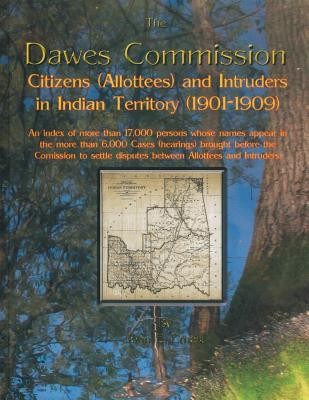
- We will send in 10–14 business days.
- Author: John E Ernest
- Publisher: Clearfield
- ISBN-10: 0806358114
- ISBN-13: 9780806358116
- Format: 21.6 x 27.9 x 4 cm, softcover
- Language: English
- SAVE -10% with code: EXTRA
Reviews
Description
On February 8, 1887, Congress passed the Dawes Act, named for its author, Senator Henry Dawes of Massachusetts. Also known as the General Allotment Act, the law allowed for President Grover Cleveland (1893-1897) to break up reservation land, which was held in common by the members of a tribe, into small allotments to be parceled out to the Citizens of the Five Nations. The Dawes Commission was responsible for activities concerning the Five Nations in Indian Territory, Oklahoma. Its major responsibility was to enforce the various treaties made between the Indian Nations and the federal government and to enforce decisions made by the Bureau of Indian Affairs (BIA) and its arm, the Union Agency. This Commission was also responsible for allotting tribal lands to eligible citizens, placing them in possession of their allotment(s) and settling disputes between the citizen allottee and intruders. The Commission was headquartered in Muskogee, IT (future Oklahoma). While the Dawes rolls are a major source of Indian citizen records, there is no central list of non-citizen intruders. The fact is that Indian Territory (Oklahoma) attracted thousands of whites and non-citizen Indians with the prospect of obtaining surplus tribal lands or renting or leasing individual allotments. This work incorporates both the intruders and the rightful allottees.
EXTRA 10 % discount with code: EXTRA
The promotion ends in 20d.14:38:34
The discount code is valid when purchasing from 10 €. Discounts do not stack.
- Author: John E Ernest
- Publisher: Clearfield
- ISBN-10: 0806358114
- ISBN-13: 9780806358116
- Format: 21.6 x 27.9 x 4 cm, softcover
- Language: English English
On February 8, 1887, Congress passed the Dawes Act, named for its author, Senator Henry Dawes of Massachusetts. Also known as the General Allotment Act, the law allowed for President Grover Cleveland (1893-1897) to break up reservation land, which was held in common by the members of a tribe, into small allotments to be parceled out to the Citizens of the Five Nations. The Dawes Commission was responsible for activities concerning the Five Nations in Indian Territory, Oklahoma. Its major responsibility was to enforce the various treaties made between the Indian Nations and the federal government and to enforce decisions made by the Bureau of Indian Affairs (BIA) and its arm, the Union Agency. This Commission was also responsible for allotting tribal lands to eligible citizens, placing them in possession of their allotment(s) and settling disputes between the citizen allottee and intruders. The Commission was headquartered in Muskogee, IT (future Oklahoma). While the Dawes rolls are a major source of Indian citizen records, there is no central list of non-citizen intruders. The fact is that Indian Territory (Oklahoma) attracted thousands of whites and non-citizen Indians with the prospect of obtaining surplus tribal lands or renting or leasing individual allotments. This work incorporates both the intruders and the rightful allottees.


Reviews